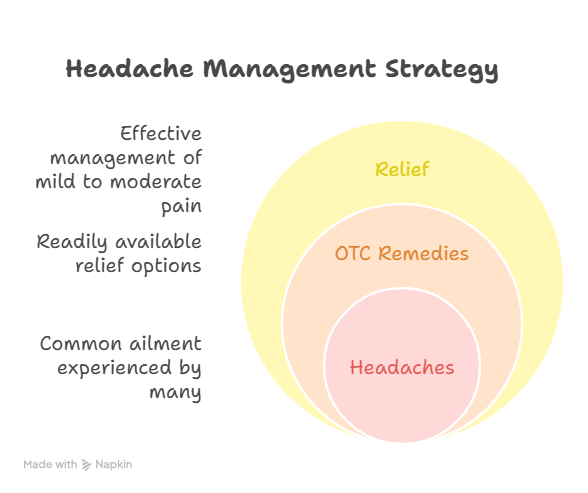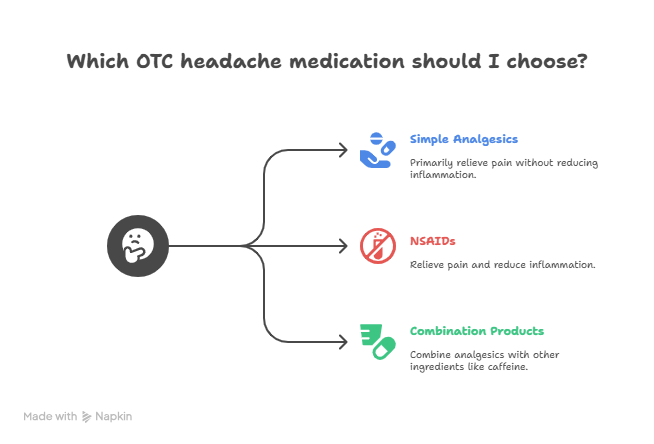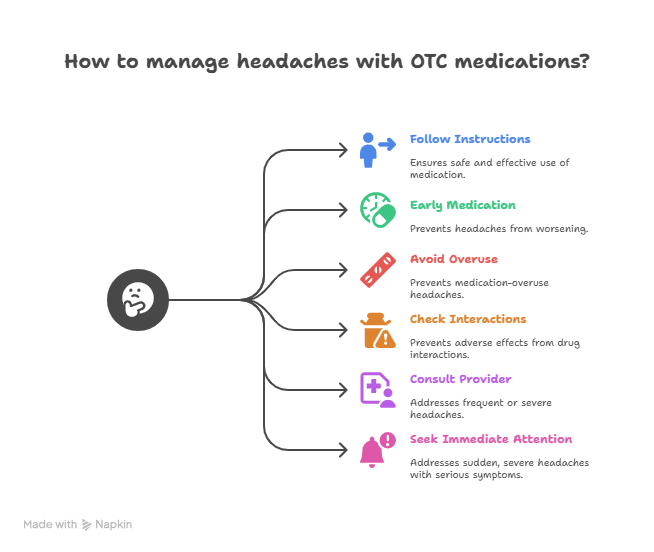Page Menu
Headaches are like those people who show up at the worst conceivable time. You know, the kind that shows up at your party and won't leave? Getting rid of a throbbing migraine or a nagging tension headache is generally the most important thing to do. Fortunately, over-the-counter (OTC) medicines can help! But before you grab that bottle of pills, let's talk about what you truly need to know about these useful tools.
Key Concepts and Top Takeaways
– Identify headache triggers: Keep a diary to track patterns and avoid known causes.
– Stay hydrated: Drink plenty of water throughout the day to prevent dehydration headaches.
– Maintain a regular sleep schedule: Aim for 7-9 hours of quality sleep each night.
– Manage stress: Practice relaxation techniques like meditation or deep breathing exercises.
– Use OTC pain relievers wisely: Follow dosage instructions on medications like ibuprofen or acetaminophen.
– Consider combination therapies: Use multiple types of remedies, such as caffeine with pain relievers, if appropriate.
– Monitor medication frequency: Limit use of OTC medications to avoid rebound headaches.
– Consult a doctor if necessary: Seek professional advice for persistent or severe headaches.
– Explore alternative treatments: Investigate options like acupuncture, chiropractic care, or herbal supplements.
– Educate yourself on side effects: Understand potential risks associated with any OTC remedy you choose.
Please Note: This post may contain affiliate links. If you click one of them, we may receive a commission at no extra cost to you. As an Amazon Associate, I earn from qualifying purchases.
Understanding Different Types of Headaches

First of all, not all headaches are the same. There are different kinds, and each one has its own style. Tension headaches feel like a tight band around your head, while migraines can make you want to curl up in a dark room and never come out again. Then there are cluster headaches, which seem like something out of a sci-fi movie but are quite real and hurt! Knowing what kind of headache you have is important because it might help you figure out which over-the-counter medicine would work best for you.
Finding out what causes your headaches might be quite useful in dealing with them. Stress, not getting enough sleep, or even that extra cup of coffee you thought would help you out—these are all things that could be sneaking up on you. Headache triggers can be very different for each person, and what makes one person sick may not bother another at all. For example, some people might notice that their headaches get worse after a hard day at work with tight deadlines and constant Zoom conversations. Others might notice that they get worse after spending too much time on screens or eating certain foods.

It's like having a superpower once you figure out what causes your headaches. You learn more about how your body reacts and what it means. It might be that you stay up late watching Netflix and then wake up with foggy eyes, or that you miss meals because you're too busy. If you can see these tendencies, you can choose a better remedy—or even better, stay away from those triggers entirely!
So the next time you feel one coming on, take a moment to ask yourself, “What did I do today?” Did I forget to drink some water? Have I been looking at my phone for hours without stopping? Thinking about the things you do every day can help you find startling links between your decisions and those annoying headaches. It might also help to keep a simple headache journal where you write down when headaches happen and what might have caused them. This diary can help you understand how different things affect your headspace over time.
I mean, who wouldn't want to avoid pain in the future? You can take charge of your life instead of having headaches control it by being proactive and knowing what makes you uncomfortable. Also, knowing these triggers can help you feel better right away and encourage you to make healthier choices in general, like making sleep a priority or adding relaxation techniques to your daily routine. So go ahead and be a detective; it might make your life better and less painful!
Common Over-the-Counter Options

There are a lot of over-the-counter medicines you can take for headaches. Acetaminophen (Tylenol), ibuprofen (Advil), and aspirin are among of the most popular options. Each one works differently in your body. Acetaminophen is ideal for modest pain relief without bothering your stomach too much. Just don't take too much or you could have liver problems!
Ibuprofen is like a Swiss Army knife for headaches. It works on both pain and inflammation. Aspirin can also work, but it isn't always easy on delicate stomachs, so keep that in mind if you have a weak stomach! To be honest, reading the labels before you take anything is quite important. They often have useful information about the dose and any adverse effects.
And we shouldn't forget about items that work together! These smart mixes include different components that are meant to help with headaches, and they can work really well. Think about a tablet that has both painkillers and caffeine or anti-nausea medicine in it. Sounds good, doesn't it? But wait a minute: just because something includes a lot of ingredients doesn't imply it's always the greatest pick for everyone.

These combination drugs generally work on more than one headache trigger at the same time. For instance, some people would take acetaminophen (the active ingredient in Tylenol), aspirin, and caffeine together to fight tension headaches or migraines from more than one perspective. This three-part threat can help you feel better quickly when your brain feels like it's hosting its own drumline. We enjoy the concept of a one-stop shop for our headaches, but we need to remember that more isn't always better.
Taking more than one medicine at the same time can cause problems or side effects that you don't want. Have you ever had that dreadful moment when you took cold medicine and painkillers together and felt worse than before? Yes, it's not fun! Taking too many different kinds of medicines at once could make side effects more likely or perhaps cause new problems. Also, some elements could not work well together, like how oil and water don't mix well.
So, here's some advice: if you're thinking about utilizing a combo product, you should go to a doctor first. They can help you understand the possibilities and select what’s best for your individual scenario. You don't want to accidentally mix up a bunch of things in your body that will make you feel bad! Always read the labels carefully and pay attention to the dosages. Those small print cautions can sometimes be quite important.
In short, combination products can be really effective for getting rid of headaches, but you should use them in moderation. Knowing what each item accomplishes can help you make smart decisions about
your health. After all, nobody wants their quest for relief to turn into an unexpected adventure in side effects! So choose wisely and keep your head happy!
Dosage Matters: How Much Is Too Much?

Now things are getting serious: the dose is important! Just because you can buy anything without a prescription doesn't mean it's safe to take a lot of it. The label on each medicine tells you how much to take. Unless a doctor tells you otherwise, you should follow this exactly.
I recall thinking I could double my dose when my headache wouldn't go away. I thought, “What could go wrong?” when I was so desperate. It's simply a bit more help with the agony! Warning: It didn't end well! I didn't feel like a superhero ready to take on the world; instead, I felt sick and even worse. The lesson is that taking more medicine is usually not the best answer.
Not going above the recommended limits is not just a nice idea, it's necessary for your health. There is a purpose behind those dose guidelines! They are meant to lower risks while making things work better. You wouldn't drive 100 miles per hour in a school zone, would you? The same idea applies here: taking more won't get you there faster just because you want relief soon.

There is a reason why over-the-counter drugs come with instructions. Researchers have looked into and evaluated the safest and most effective doses for people of different ages and health problems. Not following those rules can have bad effects, including hurting your liver or giving you stomach ulcers. That's not what you wanted when you reached for that bottle of medicines!
It's always a good idea to talk to a doctor or pharmacist if you're not sure how much to take or how often. These professionals have spent years learning about drugs and how they affect our bodies. They can provide you advice that is specific to you based on your medical history and current health. Also, they can recommend other treatments or ideas that you hadn't thought of previously, like trying some relaxation techniques or cutting back on caffeine.
In the end, it may be tempting to think that more is better when it comes to getting rid of headaches, but that's not always the case. Staying within the suggested doses keeps you safe and makes sure the medicine performs as it should. So the next time you get a headache that won't go away, don't try to be your own doctor! Believe me, your future self will be grateful that you made better choices now!
Potential Side Effects and Risks

Let's talk about side effects, which are like that annoying friend who always wants to hang out with you. Many people can handle over-the-counter drugs without any problems, but some may get stomach discomfort or feel sleepy, among other things. It's important to notice how your body reacts when you take any medicine.
For instance, taking some pain medicines for a long time can produce rebound headaches, which is when discontinuing the prescription makes your headaches worse than they were before. Because of this, it's important to not only treat current symptoms well, but also to carefully monitor use over time.
Another thing to note is that allergies do happen. It's like the twist in a movie where the individual who seems innocuous turns out to be the bad guy. You know, the one who seems really kind at first but then shows their true colors when it's too late? If you don't verify the ingredients first, that's exactly what might happen with medicines. You might assume that taking an innocent-looking tablet will make your day better, but what if it has something in it that makes you sneeze or worse?
If you know you have allergies or sensitivities, it's very important to always verify the ingredients. I mean, who wants to take a chance with their health? Imagine that you're at home, feeling the familiar throb in your temples, and saying to yourself, “This headache is about to meet its match!” You grab a bottle of painkillers and take one, only to find out later that it has something in it that you are allergic to. Instead of feeling better, you now have to cope with hives or stomach pains on top of your headache. What a way to make things worse!
Before taking any over-the-counter medicine, take a moment to think about what could happen. Read the label like it's the most exciting book you've ever read. Your health depends on it! Manufacturers must clearly state all of the ingredients; they aren't trying to hide anything (at least we hope not). If you see something you don't know or think it might cause an allergy, just put the tablet down and move away carefully.
Some common over-the-counter medicines have allergies in them that you wouldn't expect, such gluten or certain colors. Who would have thought? It's always better to be safe than sorry than to risk an adverse response that may convert your headache medicine into a full-blown episode of “Survivor: Home Edition.”
And we shouldn't forget about cross-reactivity! If you're allergic to something, like penicillin, you might want to conduct some research because some people have similar reactions to other medications that have similar ingredients. So why take a chance? If you're not sure, get in touch! Talking to a doctor or nurse can help you understand things better and feel better.
In short, always verify the ingredients before taking any medicine. If you're not careful, a tablet that looks innocent could swiftly turn into a villain. If you stay aware and pay attention to what gets into your body, you'll be ready to fight headaches without any surprises along the way!
When To Seek Professional Help

No matter how many medications we take or herbal teas we drink, it just doesn't work anymore! In these situations, it's really important to know when to get expert aid. If your headaches don't go away after trying to treat them or get a lot worse over time, you should probably see your doctor.
They will probably inquire about how often and how bad the episodes are, as well as any other symptoms that happen during them, including nausea or sensitivity. This information helps them decide if they need to look into underlying conditions more!
Another thing that should absolutely be checked out is if headaches abruptly change in nature or frequency later in life for no reason. You know how you can sometimes believe you have everything figured out? You have your usual ways of dealing with headaches, but then—bam!—your reliable headache shows up with a new attitude. It's like that friend who constantly wears the same clothes but then shows up in bright spandex. You can't help but wonder, “What happened here?”
It's important to pay notice when headaches start acting differently. They might have gone from being a little annoying to a full-blown migraine party. Or maybe you used to get them once a month, but now they come every week, or even every day! This change can be scary, and it's not something to ignore when you drink your favorite herbal tea.
It's interesting that our bodies change all the time as we get older. Changes in hormones, stress, and even new medical issues can all make chronic headache worse. If you're in your golden years of adulthood (you know what I mean), menopause or other hormonal changes could be to blame. But don't just think that these changes are natural because you're getting older; it could lead you down a path you don't want to go down.
So, why should you go to the doctor if your headaches change? It could be a sign of something more serious, including excessive blood pressure or even problems with the nervous system. I'm not trying to terrify you; I simply want to make sure you know how important it is to keep an eye on your health. It's time to see a doctor if something feels strange or different than usual, especially if you also have additional symptoms like nausea or changes in your vision.
Keep a record of your headaches so you can be ready for that appointment (and let's be honest, you want to impress the doctor with how much you know). Write down when they happen, how long they last, how bad they are (on a scale from “mild annoyance” to “please make it stop”), and any possible triggers you noted before they happened. This information can help your healthcare professional see things more clearly and decide if they need to look into things further.
In the end, it's important to trust your gut when it comes to changes in your body. Headaches may not seem like a big deal compared to other health problems, but they are still a part of the big picture of our health. So the next time you get a headache out of the blue, don't just see it as an inconvenient problem; see it as a sign to take care of yourself and explore. After all, knowing what's going on within can give us power in ways we never thought imaginable.
Natural Alternatives Worth Considering
Over-the-counter (OTC) medicines can help a lot of people with headaches right away, but they aren't for everyone (or should I say herbal tea?). Others would rather look into natural options instead! Yoga, stretching, and mindfulness meditation are all examples of holistic practices that might help with general health and possibly ease headache pain.
People who want natural remedies are turning to herbal supplements like feverfew more and more. But again, it's important to talk to a physician first to make sure they are safe for your specific health needs!
So the next time you're stuck between choosing pills and potions, remember that there isn't a one-size-fits-all answer. Trying things out intelligently could lead you down pathways that are less traveled but just as gratifying!
Suggested Resources:
Understanding Headaches
https://www.mayoclinic.org/diseases-conditions/headaches/symptoms-causes/syc-20315596
Over-the-Counter Pain Relievers
https://www.webmd.com/drugs/2/pain-relievers-over-the-counter-pain-relief
Natural Remedies for Headaches
https://www.healthline.com/health/natural-remedies-for-headache

Kevin Collier is a seasoned health writer at Otchut.com, specializing in over-the-counter medicines, common medical ailments, and general health topics. With a background in healthcare and a passion for making medical information accessible, Kevin aims to empower readers with knowledge to make informed health decisions. When he's not writing, he enjoys researching the latest in health trends and advocating for wellness in his community.





